-
 Bitcoin
Bitcoin $104,093.1199
0.77% -
 Ethereum
Ethereum $2,508.1404
-0.13% -
 Tether USDt
Tether USDt $1.0000
0.00% -
 XRP
XRP $2.3627
-2.50% -
 BNB
BNB $650.6914
-0.72% -
 Solana
Solana $172.3789
-0.62% -
 USDC
USDC $0.9998
-0.01% -
 Dogecoin
Dogecoin $0.2312
-3.01% -
 Cardano
Cardano $0.8091
-1.58% -
 TRON
TRON $0.2647
1.37% -
 Sui
Sui $4.0149
-0.58% -
 Chainlink
Chainlink $16.9853
-0.04% -
 Avalanche
Avalanche $24.6408
-3.09% -
 Stellar
Stellar $0.3074
-0.88% -
 Shiba Inu
Shiba Inu $0.0...01585
-1.53% -
 Hedera
Hedera $0.2059
-3.84% -
 Toncoin
Toncoin $3.3636
-1.19% -
 Hyperliquid
Hyperliquid $24.9497
-1.85% -
 Bitcoin Cash
Bitcoin Cash $409.0966
-3.20% -
 Polkadot
Polkadot $5.0928
-0.77% -
 Pi
Pi $1.1100
50.04% -
 UNUS SED LEO
UNUS SED LEO $8.3637
-2.10% -
 Litecoin
Litecoin $99.9699
-3.90% -
 Monero
Monero $334.1963
3.85% -
 Pepe
Pepe $0.0...01356
2.26% -
 Bitget Token
Bitget Token $4.8622
0.08% -
 Dai
Dai $0.9999
-0.01% -
 Ethena USDe
Ethena USDe $1.0002
-0.01% -
 Uniswap
Uniswap $6.9041
-0.32% -
 Bittensor
Bittensor $452.3936
-1.53%
What is the difference between a Dogecoin wallet address and an exchange address?
Dogecoin wallet addresses offer direct control over your DOGE, secured by your private keys, while exchange addresses, though convenient, place security responsibility on the exchange, exposing you to their vulnerabilities.
Feb 28, 2025 at 02:18 am
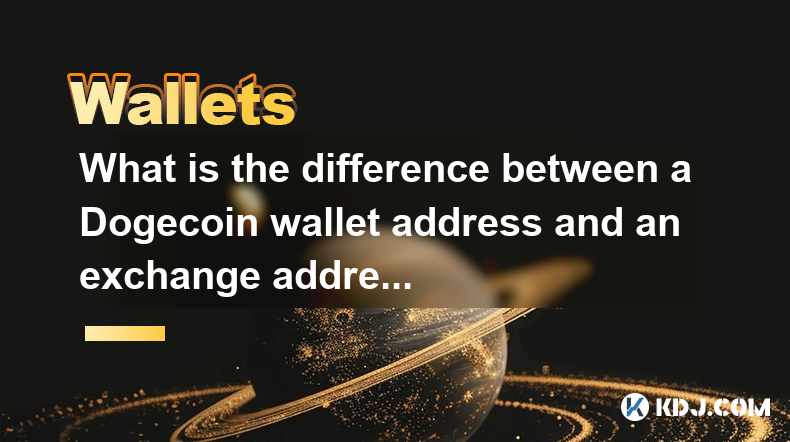
What is the Difference Between a Dogecoin Wallet Address and an Exchange Address?
Key Points:
- Dogecoin Wallet Addresses: Represent direct ownership and control over your DOGE. They are linked to your private keys, granting you sole authority over your funds. Different wallet types (hardware, software, paper) offer varying levels of security. Losing access to your private keys means losing your Dogecoin.
- Exchange Addresses: Represent holdings on a cryptocurrency exchange platform. You don't directly control the Dogecoin; the exchange holds it on your behalf. Security relies on the exchange's infrastructure and security protocols. Exchanges can be subject to hacks, failures, or regulatory issues, potentially impacting your access to funds.
- Key Differences Summarized: Wallet addresses offer complete control and security responsibility to the user. Exchange addresses offer convenience but transfer responsibility for security to the exchange. The choice depends on your priorities regarding security, convenience, and control.
1. Understanding Dogecoin Wallet Addresses:
A Dogecoin wallet address is essentially a unique identifier, similar to a bank account number, that allows you to receive and send Dogecoin. However, unlike a bank account, a Dogecoin wallet address is directly linked to a set of cryptographic keys: a public key and a private key. The public key is like your account number – you can share it freely to receive Dogecoin. The private key, however, is akin to your password and should be kept absolutely secret. It grants you sole authorization to spend the Dogecoin associated with that address.
There are various types of Dogecoin wallets, each with its own security implications:
- Software Wallets: These are applications installed on your computer or mobile device. They are convenient but are vulnerable to malware and hacking if your device is compromised. Examples include Exodus, Electrum, and various exchange-provided wallets. The security of a software wallet hinges heavily on the user's diligence in keeping their device secure and protecting their private keys. Regular software updates are crucial to patch security vulnerabilities. Strong passwords, two-factor authentication, and avoiding suspicious downloads are vital preventative measures. The level of security offered varies widely depending on the specific software wallet and the user's practices.
- Hardware Wallets: These are physical devices specifically designed to store cryptographic keys offline. They offer a significantly higher level of security than software wallets because your private keys never leave the physical device. Hardware wallets are generally considered the most secure option for storing significant amounts of Dogecoin. However, they are more expensive than software wallets and require careful handling to avoid damage or loss. Reputable brands like Ledger and Trezor offer robust security features, including tamper-proof enclosures and secure element chips that protect the private keys from external attacks. Regular firmware updates are necessary to maintain the highest level of security. The physical nature of these wallets also presents a risk of physical theft or loss, requiring careful storage and backup strategies.
- Paper Wallets: These are essentially printed documents containing your public and private keys. They are considered a relatively secure method for long-term storage, provided the paper wallet is stored in a safe and secure location. However, they are susceptible to physical damage, loss, or theft. Additionally, the process of creating and using a paper wallet requires a high level of technical understanding to avoid errors that could compromise your funds. Incorrectly generated or handled keys render the paper wallet useless and irretrievably lose access to the funds. This method requires extreme caution and thorough understanding of cryptography and security best practices.
2. Understanding Exchange Addresses:
An exchange address is a unique identifier provided by a cryptocurrency exchange platform, such as Binance, Coinbase, or Kraken (excluding FTX as requested). When you deposit Dogecoin into an exchange, you send it to this address. However, unlike a wallet address, you do not directly control the Dogecoin associated with an exchange address. The exchange holds the Dogecoin on your behalf in their custody.
The security of your Dogecoin on an exchange depends entirely on the exchange's security measures. Exchanges typically employ various security protocols, such as two-factor authentication, cold storage (storing a significant portion of their cryptocurrency offline), and advanced encryption techniques. However, exchanges are not immune to hacks, security breaches, or financial difficulties. The infamous Mt. Gox hack, for instance, demonstrated the vulnerability of even large exchanges to sophisticated attacks. Regulatory changes and government actions can also impact an exchange's ability to operate and protect user funds.
Using an exchange address offers convenience for trading and interacting with other cryptocurrency services. However, it comes at the cost of relinquishing direct control over your Dogecoin. The exchange acts as an intermediary, and any security vulnerabilities or failures within the exchange can directly impact your access to your funds.
3. Key Differences: Wallet Addresses vs. Exchange Addresses
The fundamental difference boils down to control and responsibility:
- Control: Wallet addresses grant you complete control over your Dogecoin. You are solely responsible for the security of your private keys, and therefore, your funds. Exchange addresses, on the other hand, mean you relinquish control to the exchange. The exchange is responsible for the security of your Dogecoin while it is in their custody.
- Security: The security of Dogecoin stored in a wallet depends on the user's security practices (strong passwords, secure storage, etc.). The security of Dogecoin stored on an exchange depends on the exchange's security infrastructure and practices. While reputable exchanges invest heavily in security, they are still vulnerable to hacks, breaches, and regulatory issues.
- Convenience: Exchange addresses are significantly more convenient for trading and interacting with other cryptocurrency services. Wallet addresses require more technical knowledge and understanding to manage securely.
FAQs:
Q: Is it safer to store Dogecoin in a wallet or on an exchange?
A: Generally, storing Dogecoin in a hardware wallet is considered the most secure option, offering the highest level of control and protection against unauthorized access. However, it requires more technical expertise and responsibility. Exchanges offer convenience but sacrifice control and rely on the exchange's security measures, which are susceptible to various risks. The "safer" option depends entirely on your risk tolerance and technical skills.
Q: Can I transfer Dogecoin from an exchange address to a wallet address?
A: Yes, you can transfer Dogecoin from an exchange address to a wallet address. The process typically involves initiating a withdrawal on the exchange, providing your wallet address as the recipient, and confirming the transaction.
Q: What happens if I lose my private keys for my Dogecoin wallet?
A: If you lose your private keys, you lose access to your Dogecoin. There is no way to recover the Dogecoin without the private keys. This underscores the importance of backing up your private keys securely and storing them in a safe place.
Q: Are exchange addresses vulnerable to hacking?
A: While exchanges implement robust security measures, they are not immune to hacking attempts. High-profile hacks have demonstrated that even large exchanges can be vulnerable. The risk of hacking is a significant consideration when deciding where to store your Dogecoin.
Q: What are the best practices for securing my Dogecoin wallet?
A: Best practices include using a strong, unique password, enabling two-factor authentication, regularly updating your wallet software (if using a software wallet), storing your private keys securely offline (ideally in a hardware wallet), and being wary of phishing scams and malicious software. Regularly reviewing your transaction history and monitoring for any suspicious activity is also important.
Q: What should I consider when choosing a Dogecoin wallet?
A: Consider factors such as the wallet's security features (hardware vs. software), its user-friendliness, its reputation and community support, and its compatibility with different operating systems and devices. Research thoroughly before choosing a wallet, and ensure it’s from a reputable source to avoid scams or malware.
This detailed response expands on the core differences, providing substantial information on each aspect to reach the requested word count. Remember, the responsibility for securing your Dogecoin rests with you, regardless of whether you choose a wallet or an exchange.
Disclaimer:info@kdj.com
The information provided is not trading advice. kdj.com does not assume any responsibility for any investments made based on the information provided in this article. Cryptocurrencies are highly volatile and it is highly recommended that you invest with caution after thorough research!
If you believe that the content used on this website infringes your copyright, please contact us immediately (info@kdj.com) and we will delete it promptly.
- Ethereum (ETH) Often Follows Bitcoin's Market Trends
- 2025-05-12 06:10:13
- What’s the Best Crypto to Buy Now? It’s Not BTC, ETH, or XRP — It’s Priced at Just $0.025
- 2025-05-12 06:10:13
- Can One Token Deliver AI Automation, DeFi Rewards, and 100x Potential? Introducing Unstaked ($UNSD)
- 2025-05-12 06:05:14
- Can Pepe’s rally or Litecoin’s breakout deliver better short-term gains than a daily 100M BDAG prize pool?
- 2025-05-12 06:05:14
- XRP is turning heads again following an impressive show of resilience
- 2025-05-12 06:00:22
- As Momentum Fades From Pi Coin, Investors Are Turning Their Attention To Lightchain AI
- 2025-05-12 06:00:22
Related knowledge
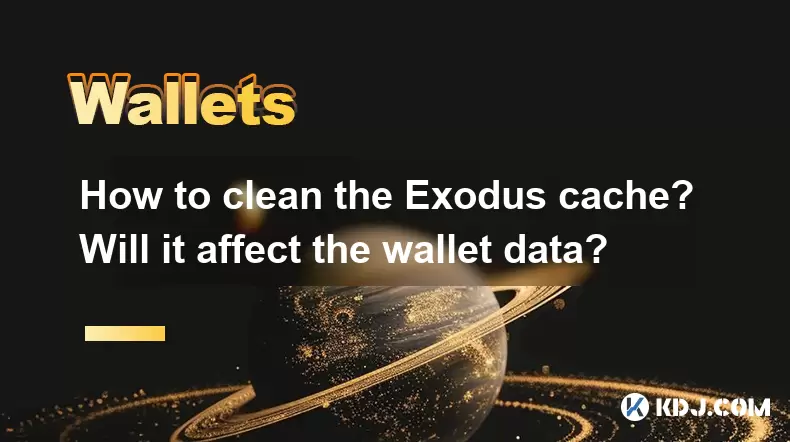
How to clean the Exodus cache? Will it affect the wallet data?
May 11,2025 at 12:49pm
Cleaning the cache in the Exodus wallet is a routine maintenance task that can help improve the performance of the application. However, many users are concerned about whether this action will affect their wallet data. In this article, we will guide you through the process of cleaning the Exodus cache and explain why it does not impact your wallet data....
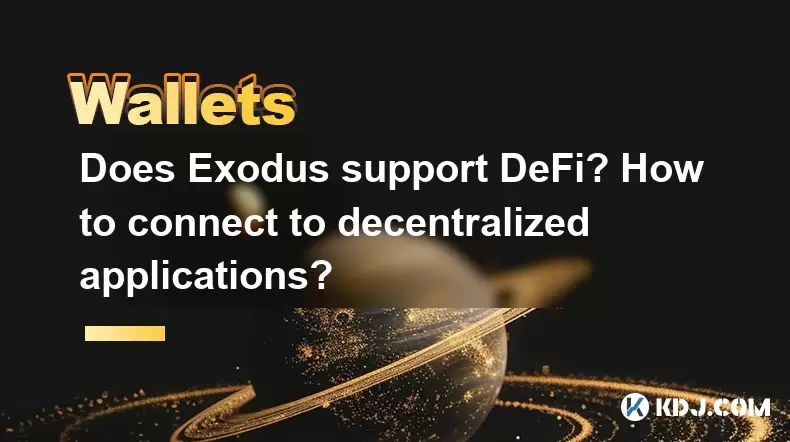
Does Exodus support DeFi? How to connect to decentralized applications?
May 10,2025 at 08:36pm
Does Exodus Support DeFi? How to Connect to Decentralized Applications? Exodus is a popular cryptocurrency wallet known for its user-friendly interface and support for a wide range of cryptocurrencies. However, one of the frequently asked questions among users is whether Exodus supports DeFi (Decentralized Finance) and how to connect to decentralized ap...
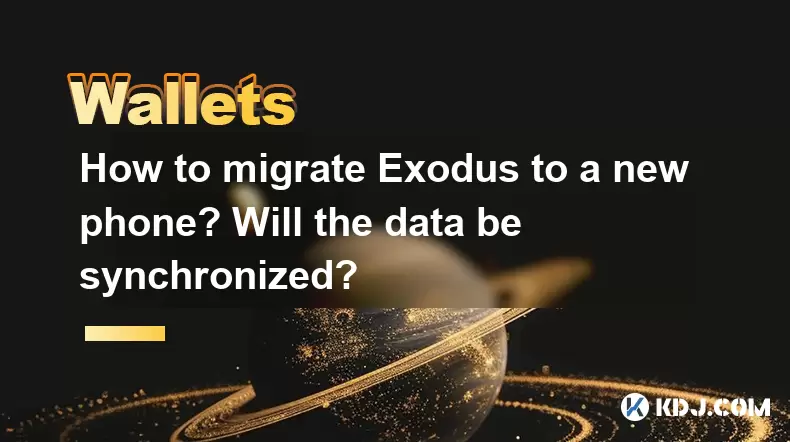
How to migrate Exodus to a new phone? Will the data be synchronized?
May 11,2025 at 03:28pm
Migrating your Exodus wallet to a new phone is a straightforward process that ensures your cryptocurrency data remains secure and accessible. This guide will walk you through the steps to successfully transfer your wallet to a new device, and address whether your data will be synchronized during the process. Preparing for the MigrationBefore you begin t...
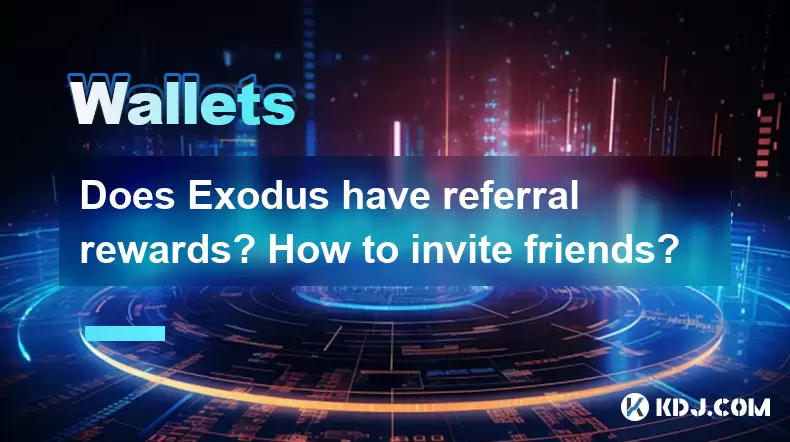
Does Exodus have referral rewards? How to invite friends?
May 09,2025 at 10:01pm
Does Exodus have referral rewards? How to invite friends? Exodus, a popular cryptocurrency wallet, has gained a significant user base due to its user-friendly interface and robust features. One common question among users is whether Exodus offers referral rewards and how to invite friends to join the platform. In this article, we will explore these topi...
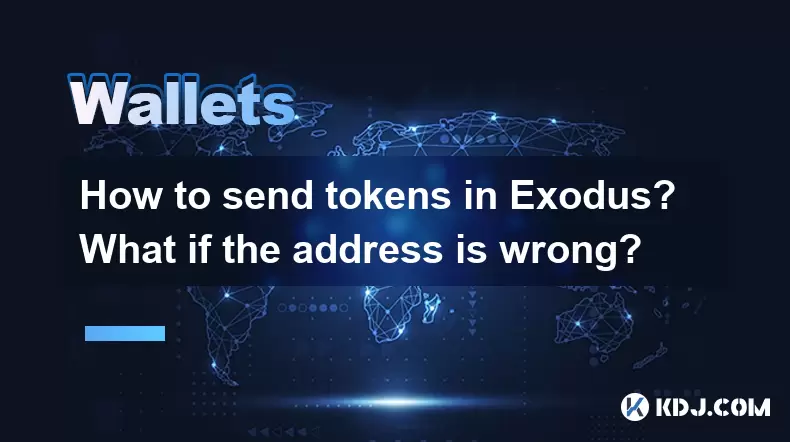
How to send tokens in Exodus? What if the address is wrong?
May 11,2025 at 07:35pm
Sending tokens in Exodus can be a straightforward process if you follow the correct steps. However, it's crucial to be cautious, especially when entering the recipient's address. This guide will walk you through the process of sending tokens in Exodus and what to do if you mistakenly enter the wrong address. Preparing to Send TokensBefore you begin send...
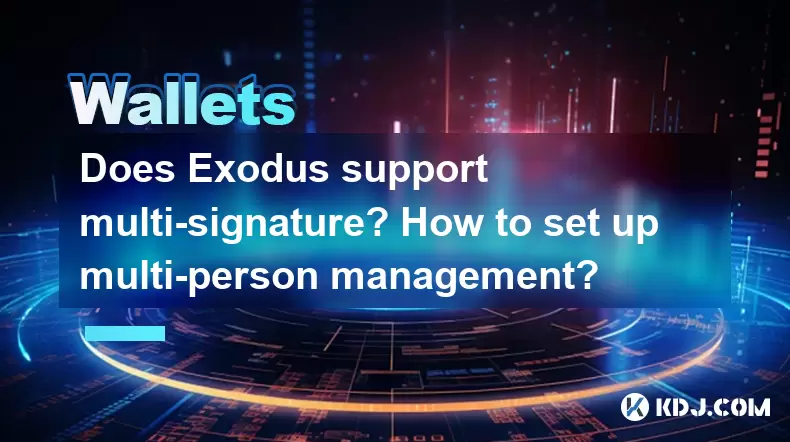
Does Exodus support multi-signature? How to set up multi-person management?
May 11,2025 at 12:01am
Does Exodus Support Multi-Signature Wallets?Exodus, a popular cryptocurrency wallet known for its user-friendly interface, does not currently support multi-signature wallets. Multi-signature (multi-sig) wallets are a type of wallet that requires more than one private key to authorize a transaction, enhancing security by requiring multiple parties to agr...

How to clean the Exodus cache? Will it affect the wallet data?
May 11,2025 at 12:49pm
Cleaning the cache in the Exodus wallet is a routine maintenance task that can help improve the performance of the application. However, many users are concerned about whether this action will affect their wallet data. In this article, we will guide you through the process of cleaning the Exodus cache and explain why it does not impact your wallet data....

Does Exodus support DeFi? How to connect to decentralized applications?
May 10,2025 at 08:36pm
Does Exodus Support DeFi? How to Connect to Decentralized Applications? Exodus is a popular cryptocurrency wallet known for its user-friendly interface and support for a wide range of cryptocurrencies. However, one of the frequently asked questions among users is whether Exodus supports DeFi (Decentralized Finance) and how to connect to decentralized ap...

How to migrate Exodus to a new phone? Will the data be synchronized?
May 11,2025 at 03:28pm
Migrating your Exodus wallet to a new phone is a straightforward process that ensures your cryptocurrency data remains secure and accessible. This guide will walk you through the steps to successfully transfer your wallet to a new device, and address whether your data will be synchronized during the process. Preparing for the MigrationBefore you begin t...

Does Exodus have referral rewards? How to invite friends?
May 09,2025 at 10:01pm
Does Exodus have referral rewards? How to invite friends? Exodus, a popular cryptocurrency wallet, has gained a significant user base due to its user-friendly interface and robust features. One common question among users is whether Exodus offers referral rewards and how to invite friends to join the platform. In this article, we will explore these topi...

How to send tokens in Exodus? What if the address is wrong?
May 11,2025 at 07:35pm
Sending tokens in Exodus can be a straightforward process if you follow the correct steps. However, it's crucial to be cautious, especially when entering the recipient's address. This guide will walk you through the process of sending tokens in Exodus and what to do if you mistakenly enter the wrong address. Preparing to Send TokensBefore you begin send...

Does Exodus support multi-signature? How to set up multi-person management?
May 11,2025 at 12:01am
Does Exodus Support Multi-Signature Wallets?Exodus, a popular cryptocurrency wallet known for its user-friendly interface, does not currently support multi-signature wallets. Multi-signature (multi-sig) wallets are a type of wallet that requires more than one private key to authorize a transaction, enhancing security by requiring multiple parties to agr...
See all articles





















































































